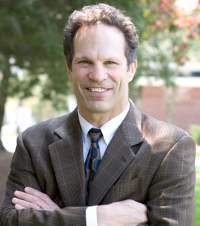
During his 30-year career spanning clinical practice, health care policy development and disability employment initiatives, UMass Medical School’s Jay Himmelstein, MD, MPH, has remained committed to his goal of improving health outcomes for all, with a special focus on the disabled and those served by public agencies.
That dedication was celebrated on Dec. 5, when Dr. Himmelstein, professor of family medicine & community health and chief health policy strategist for Commonwealth Medicine’s Center for Health Policy and Research, was presented with the Harriet Hardy Award for lifetime achievement from the New England College of Occupational and Environmental Medicine. The award was bestowed at the Marriott Newton during the group’s annual conference, held in collaboration with the Massachusetts Association of Occupational Health Nurses.
"It is truly an honor to receive this award named for Harriet Hardy, a pioneer in the field of occupational medicine who distinguished herself through clinical practice, teaching and research, and most of all through her commitment to the prevention of occupational disease and promoting health for working men and women,” Himmelstein said.
The Harriet Hardy Award is given annually to an individual who has demonstrated an effort to understand disease or injury caused by working conditions and attempted to improve those conditions to prevent or minimize the impact of the health and lives of workers. Considered a pioneer in occupational medicine, Hardy discovered that Lynn and Salem factory workers suffering from respiratory illness in the 1940s had actually contracted berylliosis from exposure to metal beryllium.
Himmelstein was the founder of the joint UMass-Harvard residency in Occupational and Environmental Health, and directed the Occupational Health Program at UMass from 1987-1997. One of his early accomplishments was to edit the first evidence-based monograph on the physicians’ role in determining worker fitness and risk, which established new guidelines for the appropriate use of health-related information in making employment decisions.
During his keynote acceptance speech, Himmelstein described selective challenges confronted during his career to date, spanning his early involvement with the prevention of workplace based injuries and leading the Robert Wood Johnson Foundation Workers Compensation Health Initiative, to his focus on national health reform dating from his work in the early 90s as health staff for Sen. Edward M. Kennedy. Himmelstein also described lessons from his work in Medicaid policy, and the opportunity for health providers and policy makers to contribute to self-sufficiency and the quality of life for people with severe disabilities. Himmelstein and his UMMS colleagues played a significant role in the national adoption of programs with roots in Massachusetts, which allow people with severe disabilities to return to work without losing essential health benefits offered only by the Medicaid program. Himmelstein is the founding director of Work Without Limits, a statewide network of employers and partners aimed at advancing employment for people with disabilities, based within Commonwealth Medicine’s Disability, Health and Employment Policy unit.
Himmelstein’s interest in occupational medicine was piqued during a family medicine internship in Bangor, Maine, when a Tufts University visiting professor spoke about the environmental issues that may be causing the diseases seen in the emergency room.
Himmelstein went on to get a master’s degree in public health during his residency at the Occupational and Environmental Health Residency program at the Harvard School of Public Health. While at Harvard, Himmelstein worked on the investigation of lead poisoning in workers and children resulting from the removal of lead paint from Boston’s Mystic Tobin Bridge.
“Occupational health allows physicians an opportunity to make a big impact on the lives of those we serve through treatment and prevention,” Himmelstein said. “It is also a true team sport, and I am grateful to my mentors and colleagues for their ongoing inspiration and support.”